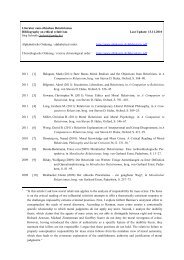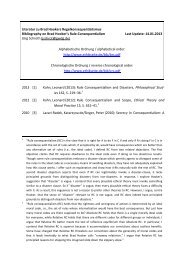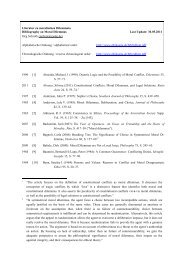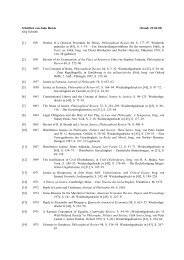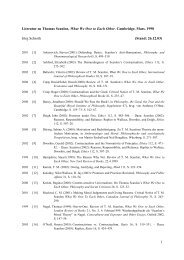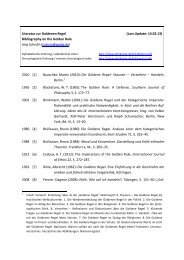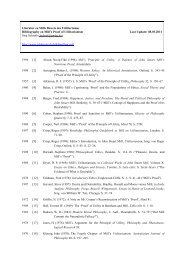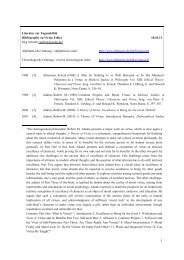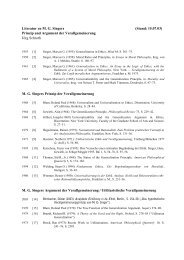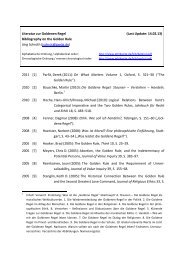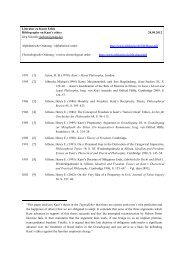Chronologische - Ethikseite
Chronologische - Ethikseite
Chronologische - Ethikseite
Create successful ePaper yourself
Turn your PDF publications into a flip-book with our unique Google optimized e-Paper software.
Monika Betzler, Berlin, S. 279–302.<br />
2001 [611] Fricke, Christel (2001): Kants Theorie des guten Willens zwischen empiristischer<br />
Konsenstheorie und Crusianischer Moraltheologie, in Kant und die Berliner<br />
Aufklärung. Akten des IX. Internationalen Kant-Kongresses, hrsg. von Volker<br />
Gerhardt, Rolf-Peter Horstmann und Ralph Schumacher, Berlin, New York, Bd. III,<br />
S. 202–10.<br />
2001 [612] Friebe, Cord (2001): Der Kategorische Imperativ bei Kant und Freund, in Systematische Ethik<br />
mit Kant, hrsg. von Hans-Ulrich Baumgarten und Carsten Held, Freiburg, S. 192–210.<br />
2001 [613] Glasgow, Joshua M. (2001): Kant’s Non-Prudential Duty of Beneficence, in Kant und die Berliner<br />
Aufklärung. Akten des IX. Internationalen Kant-Kongresses, hrsg. von Volker<br />
Gerhardt, Rolf-Peter Horstmann und Ralph Schumacher, Berlin, New York, Bd. III,<br />
S. 211–19.<br />
2001 [614] Green, Ronald M. (2001): What Does it Mean to Use Someone as “A Means Only”: Rereading<br />
Kant, Kennedy Institute of Ethics Journal 11 (3), S. 247–61. 136<br />
2001 [615] Grenberg, Jeanine M. (2001): Feeling, Desire and Interest in Kant’s Theory of Action, Kant-<br />
Studien 92, S. 153–79.<br />
2001 [616] Guyer, Paul (2001): The Form and Matter of the Categorical Imperative, in Kant und die<br />
Berliner Aufklärung. Akten des IX. Internationalen Kant-Kongresses, hrsg. von<br />
Volker Gerhardt, Rolf-Peter Horstmann und Ralph Schumacher, Berlin, Band I, S.<br />
131–50. Wiederabgedruckt in Guyer, Kant’s System of Nature and Freedom. Selected<br />
Essays, Oxford 2005, S. 146–68.<br />
2001 [617] Held, Carsten (2001): Kant über Willensfreiheit und Moralität, in Systematische Ethik mit<br />
Kant, hrsg. von Hans-Ulrich Baumgarten und Carsten Held, Freiburg, S. 124–61.<br />
2001 [618] Hepfer, Karl (2001): „… der Stein der Weisen“: Motivation und Maximen, in Kant und die<br />
Berliner Aufklärung. Akten des IX. Internationalen Kant-Kongresses, hrsg. von<br />
Volker Gerhardt, Rolf-Peter Horstmann und Ralph Schumacher, Berlin, New York,<br />
Bd. III, S. 220–29.<br />
2001 [619] Herman, Barbara (2001): Rethinking Kant’s Hedonism, in Fact and Value: Essays on Ethics<br />
and Metaphysics for Judith Jarvis Thomson, Cambridge. Revidierte Version in<br />
Herman, Moral Literacy, Cambridge, Mass. 2007, S. 176–202.<br />
2001 [620] Himmelmann, Beatrix (2001): Die Lüge als Problem für Kants praktische Philosophie, in Kant<br />
136 “Debates about commodification in bioethics frequently appeal to Kant’s famous second formulation of the<br />
categorical imperative, the formula requiring us to treat the rational (human) being as “an end in itself” and<br />
“never as a means only.” In the course of her own treatment of commodification, Margaret Jane Radin<br />
observes that Kant’s application of this formula “does not generate noncontroversial particular<br />
consequences.” This is so, I argue, because Kant offers three different--and largely incompatible-interpretations<br />
of the formula. One focuses on the obligation to preserve rational willing; the second stresses<br />
respect for human (physical) dignity and integrity; the third views respect for others as “ends in themselves”<br />
as primarily involving a willingness to govern one’s conduct by a procedure of impartial co-legislation.<br />
Only the third of these interpretations, I conclude, offers a reasonable and coherent approach to moral<br />
judgment about the limits of commodification.”



